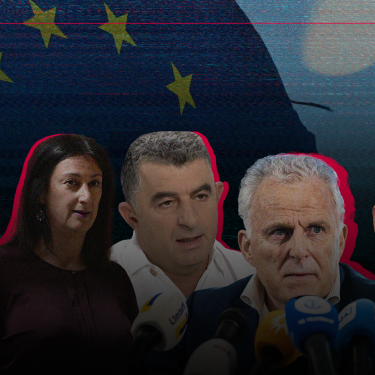Member states must do more to implement European Commission's recommendation on journalists' safety

Countries that have done little to implement the European Commission's two-year-old recommendation on journalists' safety must now move quickly to protect media professionals and combat impunity for violent crimes against them, says Reporters Without Borders (RSF). When contacted by RSF, Bulgaria and Slovakia detailed measures that they plan to take, but Malta and Poland just offered vague promises.
The European Commission issued its recommendation on safety of journalists two years ago, on 16 September 2021, following the murders of four journalists in Europe during the previous four years – Daphne Caruana Galizia in Malta, Jan Kuciak in Slovakia, Giorgos Karaivaz in Greece and Peter R. de Vries in the Netherlands.
Two years later, it is clear that specific new measures to protect media personnel are still all too rare in the four priority areas analysed by RSF: progress in investigations into crimes of violence against journalists; cooperation between authorities and the media community; support services for journalists; and measures to ensure their safety while covering protests.
RSF analysed implementation of the recommendation in a sample of ten countries with varied rankings in RSF's 2023 World Press Freedom Index: Bulgaria (71st), France (24th), Germany (21st), Greece (107th), Italy (41st), Malta (84th), Poland (57th), Slovakia (17th), Spain (36th) and Sweden (4th). When contacted by RSF, the Bulgarian, Maltese, Polish and Slovak governments made new pledges.
"While we welcome the new commitments of some governments, there is nothing to celebrate on the second anniversary of the EU recommendation on the safety of journalists. We regret that the national authorities have learned few lessons from the murders of four European journalists and the multiple threats weighing on media professionals. We call on governments to speed up implementation of the 2021 recommendation.
As regards action, four of the governments questioned by RSF said they would do more for the safety of journalists. The Bulgarian cabinet's spokesperson, Konstantina Markova, said an inter-ministerial working group on the protection of journalists was launched this summer and that it will "continue working on key recommendations." This initiative is in line with the wave of positive signals already sent by the Bulgarian government in July and August.
Her Maltese counterpart, Edward Montebello, told RSF that Malta has “applied and is applying the measures enlisted by the European Commission" and that it is “determined to adopt legal changes.” But the Maltese government refuses to publish the report on press freedom reforms drafted by an advisory body on the adoption of the recommendations resulting from the public inquiry following Caruana Galizia's murder in 2017.
The Polish culture ministry said it thought Poland's legislation already complied with many of the provisions in the European recommendation, and reported that it was currently at the stage of collecting data on the best practices of other state institutions responsible for applying the recommendation before considering legislative amendments designed to improve Poland's implementation.
The Slovak authorities, for their part, reported that they are preparing internal procedures on protecting reporters during protests, a review of the training provided to judges, and the creation of a "standing working group" to "coordinate and evaluate the effectiveness of these measures.”
RSF's four recommendations for protecting journalists
In order to go further in implementing the European recommendations, RSF asks member states to:
- Conduct independent, effective and transparent investigation into crimes of violence against journalists. While France, Germany, Spain and Sweden largely respect this principle, the level at which these crimes are prosecuted is only moderate in Italy, is low in Greece, Malta, Poland, Slovakia, and is non-existent in Bulgaria. Despite some judicial progress, all of the instigators of the murders of Daphne Caruana Galizia in 2017, Jan Kuciak in 2018 and Giorgos Karaivaz in 2021 have not yet been convicted.
- Create or support mechanisms for cooperating with journalists with the aim of improving their safety. With encouragement and support from RSF, such initiatives have been launched in several countries since 2021, including France, Greece, Slovakia and Spain. Such systems already existed in Germany, Italy and Sweden before the European Commission issued its recommendation. Systematic cooperation between authorities and journalists is non-existent in Bulgaria, Malta and Poland.
- Launch or support dedicated assistance services for threatened journalists. While these services are provided – often with the direct participation of non-governmental organisations such as RSF – in France, Germany, Italy, Slovakia and Sweden – they are not sufficiently supported by the authorities. Worse still, journalists in Bulgaria, Greece, Malta, Poland and Spain do not have any dedicated system and, at the national level, can only appeal to human rights organisations.
- Take specific measures for protecting journalists while they are covering protests. National authorities should, in particular, organise training for police, prosecutors and judges, establish a risk-mitigation strategy for journalists, and provide for effective communication between police and journalists during protests. While these recommendations have been adopted to a degree in France, Germany, Italy, Slovakia and Sweden, they have not prevented violence against reporters. In France, dozens of reporters have been attacked by police and protesters since 2021 while, in Germany and Italy, reporters have mainly been attacked by extremist groups. To RSF's knowledge, no training or risk-reduction strategy has been implemented in Bulgaria, Greece, Malta, Poland, Slovakia and Spain.
